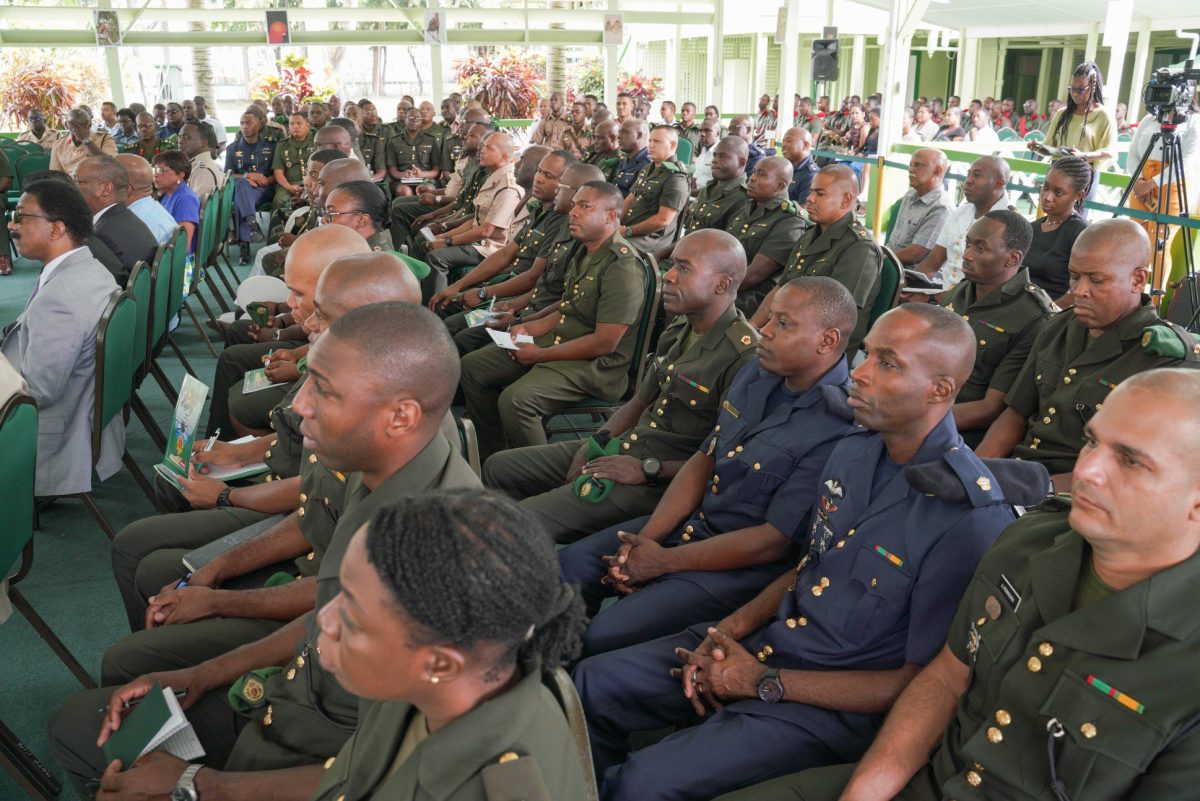Addressing the Annual Officers’ Conference of the GDF at State House today, President David Granger said that the Defence Force today “is fit for role”.
An excerpt of the President’s address follows:
The Defence Force has effected organisational change in order to better identify and deter threats to territorial integrity and the national patrimony. The past five years have witnessed the Force’s regularization, reorganization and recapitalization.
The Defence Force today is fit for role. The promulgation of a defence doctrine, the strengthening of the technical corps, the pursuit of defence cooperation with friendly countries and the implementation and organizational restructuring have improved the Force’s readiness to respond to threats.
The Force’s overarching defence policy – the doctrine of Total National Defence – implies that all the elements of national power – diplomatic, economic, military, political, social and technological – will be employed to reinforce defence and promote economic development. This doctrine means that the nation must depend on an affordable but effective Defence Force while counting on the cooperation of citizens in the event of a challenge to its territorial integrity.
Improvements in the technical corps – particularly the Air Corps, Engineer Corps, Signal Corps and Coast Guard – have enhanced the Force’s agility and capability. The Air Corps’ fleet was augmented with the acquisition of light reconnaissance aircraft. The Signal Corps benefitted from the acquisition of new communications equipment and personnel training. The Engineer Corps received equipment to improve its responsiveness to climate hazards and promote greater stability and climate resilience in frontier communities particularly in the South Rupununi.
The Force’s recapitalization programme has been boosted by increases in Central Government’s budgetary allocations. The Force has received financial resources to improve its capabilities. Budgetary allocations increased by more than 72.7 per cent from G$ 8.04 B in 2014 to G$13.9 B in 2019.
Defence cooperation has allowed the Force to benefit from donations of equipment, training and participation in military exercises with friendly states. It has enhanced cooperation in combatting transnational crime and managing disasters.
The Force’s policy for the augmentation of the Reserve has allowed the Militia’s personnel strength to grow from fewer than 125 members in January 2015 to nearly 1,500 in January 2020. The presence of the Militia in all ten administrative Regions allows for swifter response to threats and emergencies, wherever and whenever they occur.
The Force’s border defence policy strengthens the security of our frontier villages and protects them from threats of incursions.
The Force’s institutional reorganization policy established a more resilient architecture for the high command with the restoration of the appointments of Adjutant General, Inspector General, Quartermaster General and Commandant of the Militia.
These changes allowed dedicated superior officers to pay undivided attention to discipline, recruitment and soldiers’ morale; to the improvement of soldiers’ living conditions; to the maintenance of a high state of operational readiness and to inter-operability with fraternal hemispheric armies and Caribbean defence forces and the mobilization and training of reserves.
The Force’s training policy for the ground forces has re-focused attention on operations in the jungle, rivers and savannahs and to improving logistical support to soldiers in the field, in difficult weather and terrain, for long periods. I was happy to visit the Force’s annual exercises at the Tacama Training Area (TTA) in East Berbice to witness how effective these changes have been.
The promotion of greater training in long-range jungle operations will ensure a more versatile force. It will better equip our Defence Force to help to protect the country’s biodiversity, mineral resources and the integrity of our environment. The Decade of Development will incorporate policies to better equip the Defence Force to protect our country’s natural resources, on land and at sea.
The Defence Force, today, is a superior organization to what it was five years ago. Public confidence in its capabilities has been restored. National defence, as a consequence, has improved. These improvements will continue over the next ten years.






